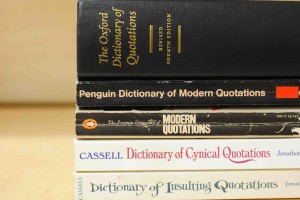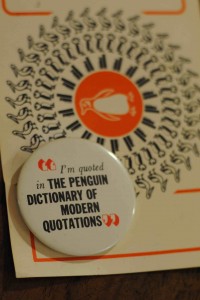The Quotable Burgess
-
Graham Foster
- 16th September 2013
-
category
- Blog Posts
There is a quotation that is often attributed to Anthony Burgess. It appears in books of quotations, on various websites, it floats around Twitter on almost a daily basis and even has its own Facebook group.
The quotation is: ‘Laugh and the world laughs with you; snore and you sleep alone’.
Removed from its context, this paints Burgess as a purveyor of pithy wisdom, rather than a writer that resists this sort of reduction with his complex and verbose novels. The quotation in question is from Inside Mr Enderby. The eponymous poet has been asked by his friend, Arry, to write some love poetry for the wooing of a barmaid. Enderby sees the barmaid for the first time:
‘She seemed a repository of old bar wisdom, epigrams, radio-show catch-phrases. A car salesman bought her a Guinness and she toasted him with “May you live for ever and me live to bury you.” Then, before drinking, she said, “Past the teeth and round the gums, look out, stomach, here it comes.” She had a fair swallow. She had decorated her little bar with poker-work maxims: “Laugh and the world laughs with you; snore and you sleep alone.” “Water is good drink when taken in the right spirit.” “When you’re up to your neck in hot water be like the kettle and sing.”’
This ‘old bar wisdom’, for Enderby, has a ‘gnomic tautness’, but does not have the ability to explain something like love, which is ‘imprecise and diffuse’. Burgess, as the author of this scene, seems to be suggesting that these easily quotable maxims do not help in the explanation of anything complex in the human experience. Burgess himself admits that this quotation is erroneously attributed to him: ‘the Penguin Book of Modern Quotation (in which, wrongly but I’m not grumbling, I am credited with the immortal “Laugh and the world laughs with you, snore and you sleep alone”)’.
Throughout his life, Burgess often appeared in dictionaries of quotations. Some of these quotations are often found in many different dictionaries. For example, ‘He said it was artificial respiration, but now I find I am to have his child’, from Inside Mr Enderby, is found in The Oxford Dictionary of Quotations (1996 edition), and The Penguin Dictionary of Modern Quotations (both the 1972 and 1980 editions) among other places. In fact, looking at the evidence in the myriad dictionaries in the collection at the International Anthony Burgess Foundation, Inside Mr Enderby seems to be Burgess’s most quotable book, even surpassing A Clockwork Orange for the number of quotations memorialised in such a way.

Burgess writes about the importance of dictionaries of quotation, calling them ‘the iron rations of literature in a knapsack’. Yet, he has some strong ideas about who should be quoted and what sort of quotation is worthy of canonisation. Writing about Jonathon Green’s A Dictionary of Contemporary Quotation (which features such luminaries as Ernie Wise, Bette Davis, Mick Jagger and Hugh Hefner), Burgess bemoans ‘the lack of memorability, of the sharply epigrammatic or tersely elegant or just elegant’. He suggests that the art of quotation has changed from the literary epigram to the wisecrack, and that these statements fail to ‘haunt the mind’.
But what is quotation for? Why do we take to Twitter to post our favourite quotations? The fact that Burgess’s most memorialised line is the above (falsely attributed and context free) maxim may reveal a need to communicate common experience or universal truths, and to be able to discuss that experience or truth in efficient, easily recognisable ways. With this in mind, does Burgess have a better quotation than the one recorded above?

From Little Wilson and Big God: ‘Wedged as we are between two eternities of idleness, there is no excuse for being idle now’.
From A Clockwork Orange: ‘It is as inhuman to be totally good as it is to be totally evil’.
Burgess on Samuel Beckett: ‘Life is a wretched grey Saturday but it has to be lived through’.
Burgess in the Paris Review: ‘The world has so much solace to offer: love, food, music, the immense variety of race and language, literature, the pleasure of artistic creation’.
Burgess in the Observer: ‘Christmas is a good time and a loving time […] tomorrow is for hangovers and vilifications’.
These quotations may allow us to feel a glow of recognition, or to be comforted by the aphoristic truth, yet they say nothing about the complexity and variety of Burgess’s fictional project. Maybe, as with Enderby’s ‘old bar wisdom’, these pithy observations will eventually lead to frustration a their inability to encapsulate the more complex aspects of human experience. It is only the long form that can do that, and perhaps we would be better to look at Earthly Powers and its elegant discussions of death, identity and religion, or at Nothing Like the Sun and its nuanced representation of creativity and love.


